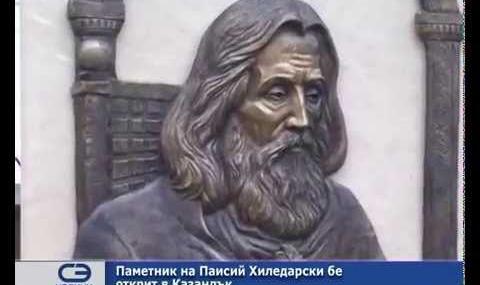On June 19, our Orthodox Church honors the memory of Paisius Hilendarski.
When the Bulgarian people fell into the worst condition under the double five-century Greco-Turkish slavery, then God raised up Reverend Paisius Hilendarski, who wrote his remarkable "Slavic Bulgarian History" and through it he instilled national consciousness and strength in the Bulgarian people, pulled them out of their despair and started the Bulgarian revival.
He was born in the city of Bansko, at the foot of the legendary Pirin mountain, in 1722. Born into a pious family - one of his brothers, Lavrentiy, was the abbot of the Hilendar Monastery, and the other, Valcho, was a generous donor to churches and monasteries - he first became a novice in the nearby Rila Monastery, where he nourished his soul with patriotic care for his own people and with sainthood by the great Bulgarian saint John of Rila.
A little later, in 1745, already at the age of 23, he went to his brother Lavrentiy in Hilendar and accepted monasticism here. In the monastery, Paisius had the opportunity to be educated and study better and to rise spiritually. As a monastery messenger (taxidiot), he traveled around villages and towns to collect aid and attract pilgrims to the monastery. In this direct contact with the people, Paisius best saw the plight of the Bulgarian people under Greek-Turkish slavery. In the Athos monasteries, he saw and personally experienced the arrogant and contemptuous attitude of foreigners towards the Bulgarians - that they were simple and rude, that they had no history. Paisius painfully saw the waning despair of the people, deeply grieved and indignant at the apostasy of many Bulgarians, who followed foreign customs and a foreign language, and despised the pure Bulgarian manners and their native language. Then a patriotic and pious zeal flared up in him, the fruit of which was his inspired "Slavic Bulgarian History" (1762) "for the benefit of the Bulgarian people, and for the glory and praise of the Lord Jesus Christ".
He received a pious home upbringing and drew from the sanctity of St. John of Rila, Venerable Paisius and of Aton, he found himself in an ascetic environment, known for many ascetics of piety who shone in grace and especially reverend martyrs - monks who died as martyrs for Christ from Agarian hand. And he himself, with modest words of monastic humility, hints at his asceticism: he suffered from stomach - which means he overdid the fast, and from headaches - which means that he shortened his sleep to the extreme.
After he had written his story with great effort, he, like a true equal apostle, set out to spread it all over the Bulgarian land so that it could be read and copied. In this way, Venerable Paisius ignited the fire of the Bulgarian national enlightenment and revival. And in this diligent activity of equal apostle and national awakener, he died unknown where, perhaps a martyr - if not killed by the hand of the enemy, then broken by overwork. The day and year of his death are unknown, which is why his memory is celebrated on his name day - June 19, when Venerable Paisius the Great is honored.
